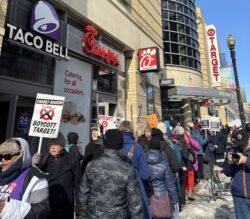With diving suits and other military gear just outside the door, the men and women assembled in the Naval Memorial auditorium Monday night by Councilmember Jim Graham (D-Ward 1) looked like they were making a battle plan. But instead of fighting a foreign enemy, the panel was fighting the question being asked by city and state governments around the country: what do you do when the money runs out?
The panel was formed to assemble experts and solicit ideas from the public on how the Washington Metropolitan Area Transit Authority can cover an over-$100 million budget gap for the 2011 fiscal year, and pay for $11.4 billion in capital expenditures over the next ten years.
“WMATA is just the messenger,” said Diana Zinkl, the chair of the Rider’s Advisory Council. Zinkl said that WMATA’s budget problems are caused in part by the economy, which takes money out of both government and household transit budgets.
What’s makes WMATA’s budget problems so urgent is that, unlike fiscal issues in other D.C. agencies, lives are literally at stake. While the Metro accident on June 22 has been blamed on an aging track switch, the accident was made more fatal because it involved obsolete cars that could not handle collisions. If Metro’s budget dilemma is not solved, outdated equipment like the cars involved in the June 22 crash will continue to be used in the system, and maintenance checks that could spot problems could be curtailed to save money.
Unfortunately for D.C., and politically-embattled WMATA board member Graham, the ideas presented Monday night veered between well-meaning but small-scale to the wildly unrealistic. On the former side, Craig Simpson, the legislative representative for Amalgamated Transit Union Local 689, a WMATA union, said Metro could save money by adjusting bus schedules on holidays. Chief among the wildly unrealistic side was a written suggestion from the audience that Metro expand to 24-hour service on weekends, an idea which provoked audible groans.
Despite the panel’s limited initial success, Graham deserves credit for assembling a unique team to deal with the issue. The best surprise was the inclusion of David Alpert, the ringleader of local transit and planning blog Greater Greater Washington. Alpert’s inclusion on the panel was surprising in part because of his site’s feud last year with Metro over open records requests. Some of that old tension was still there—when Alpert mentioned a WMATA document leaked to the Washington Post, Metro General Manager John Catoe tightened his face and stared straight ahead.
Tensions are to be expected in a group with such competing agendas. Simpson, after all, wouldn’t have a job if his union’s members thought Catoe always made the right decision. That Graham was able to assemble them all in the auditorium to work on Metro’s problems is a bit of good news for Metro in a year that’s been full of bad news for the organization. With tough budget decisions to be made, let’s just hope this spirit of conciliation remains.
Dig deep into Will’s pockets at wsommmer@georgetownvoice.com.




